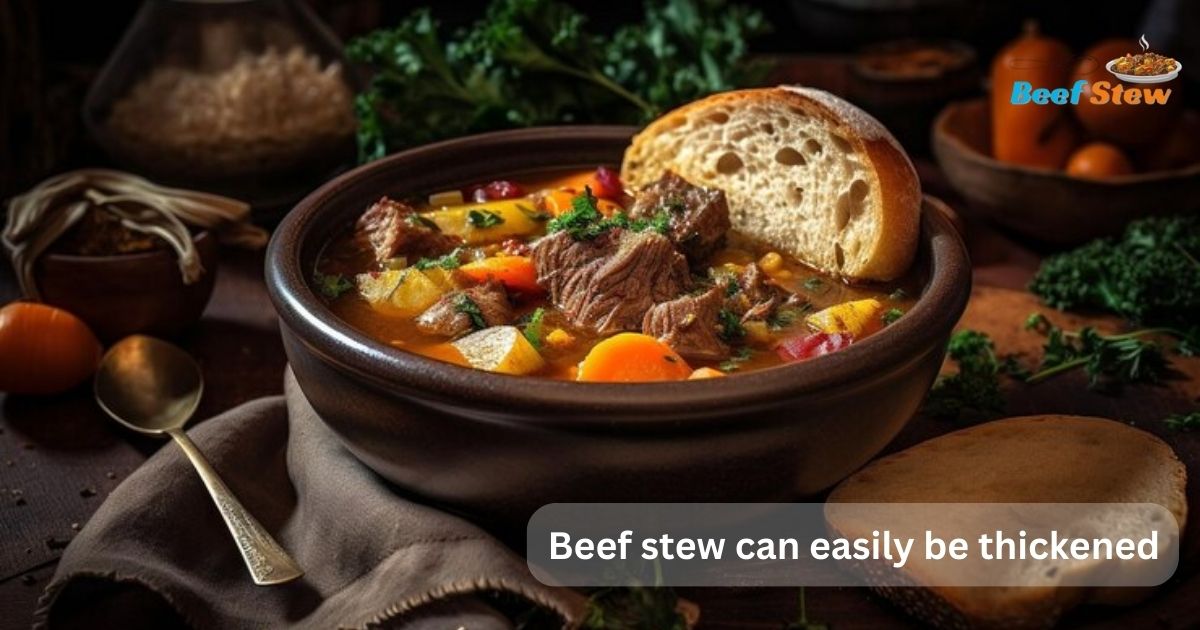Beef stew not thickening refers to a common culinary challenge where the stew fails to achieve the desired thickness during the cooking process.
Ever find yourself eagerly awaiting a hearty bowl of beef stew, only to be disappointed because it remains thin and soupy? There are several reasons why beef stew does not thicken, which can be a frustrating situation that leaves cooks perplexed and searching for a solution.
To overcome the problem of beef stew not thickening, consider adjusting cooking techniques such as increasing the simmering time or adding thickening agents such as flour or cornflour. By understanding these simple adjustments, achieving a perfectly thick beef stew becomes an achievable culinary feat.
Thicken stew with flour or cornstarch
When thickening a stew, two common options are flour and cornstarch. These ingredients act as thickening agents by absorbing liquid and creating a thick consistency. To thicken a stew with flour, make a slurry by mixing the flour with cold water or broth until smooth, then slowly add it to the simmering stew, stirring constantly to prevent lumps.
Similarly, cornstarch can be mixed with cold water and added to stews, effectively thickening them. Whether using flour or cornstarch, remember to adjust the amount according to the desired thickness, as a little goes a long way. By using these simple techniques, achieving a thick and hearty stew becomes easily achievable.
Slow-cooker beef stew not thickening

When using a slow cooker to prepare beef stew, it can be frustrating to find that the stew isn’t thickening as desired.Long, lengthy cooking times are the root of this frequent issue since they may not reduce liquid content sufficiently.
To keep slow cooker beef stew from thickening, consider adjusting the cooking time or increasing the heat during the latter stages of cooking to promote evaporation and thickening. Additionally, adding thickening agents such as flour or cornstarch during the last hour of cooking can help achieve the desired consistency. By implementing these adjustments, you can ensure that your slow cooker beef stew turns out thick, flavorful, and satisfying.
Beef stew not thickening reddit
Tips for Thickening Beef Stew: Insights from Reddit Users
Are you struggling to thicken your beef stew to the perfect consistency? Look no further! We’ve gathered expert tips from Reddit users who have mastered the art of thickening beef stew. Whether you’re working with a watery broth or a thin sauce, these tried-and-tested methods are sure to elevate your stew game.
- Flour and Meatball Technique: A Reddit user suggests rolling meatballs in flour and browning them in a pan with oil. The brown flour from the meatballs acts as a natural thickener for the stew, adding depth of flavor and richness.
- Traditional Roux Method: Another Redditor, famous for her family’s beef stew skills, shares her secret roux recipe. They melt butter in a saucepan, add flour, and cook until bubbly before stirring into a hot stew. This method thickens the stew almost immediately, allowing adjustments to be made to achieve the desired thickness.
- Cornstarch Slurry or Instant Mashed Potato Flakes: Some users prefer alternative thickeners such as cornstarch mixed with cold water or instant mashed potato flakes. These ingredients are added to the stew to achieve the desired thickness, providing an easy solution for those looking for a quick fix.
- Cornstarch Technique: A Reddit user advises against throwing cornstarch straight into the stew. Instead, he suggests scooping up some broth, bringing it to a gentle boil, and slowly stirring in cornstarch until thickened. This thickened mixture is then added to the main vessel, ensuring distribution and optimum thickness.
By incorporating these expert tips from Reddit users, you can confidently tackle any beef stew that refuses to thicken. Whether you choose the traditional roux method or experiment with alternative thickeners, this tried-and-tested technique is guaranteed to impress your taste buds and leave you with a hearty, thick meat stew.
Remember, the key to a successful stew lies in patience, experience, and a willingness to adapt. With these insights from Reddit users, you’ll never have to worry about lean or watery beef stew again!
How to thicken beef stew after it is cooked
If you find yourself with a thin beef stew after cooking, don’t fret; there are simple ways to thicken it up. One effective method is to create a slurry by mixing equal parts flour or cornstarch with cold water, then gradually stirring it into the stew while simmering.
Alternatively, you can mash some of the cooked vegetables or potatoes from the stew to release their natural starches, which will help thicken the broth. Another option is to remove a portion of the stew, blend it until smooth, then stir it back into the pot to add thickness and richness. By employing these techniques, you can easily adjust the consistency of your beef stew to your liking, ensuring a hearty and satisfying meal every time.
How to make stew thicker without flour
If you’re looking to make your stew thicker without using flour, there are several alternatives to consider. One option is to use cornstarch, which can be mixed with a small amount of cold water before being added to the stew as a thickening agent.
Another alternative is to incorporate mashed potatoes into the stew, as their natural starch content helps thicken the broth while adding a creamy texture. Additionally, you can simmer the stew uncovered for a longer period, allowing excess liquid to evaporate and resulting in a thicker consistency. By utilizing these methods, you can achieve a hearty and flavorful stew without the use of flour, catering to dietary restrictions or preferences while maintaining a delicious end result.
How to thicken beef stew with flour
Thickening beef stew with flour is a simple and effective technique to achieve a hearty consistency. To do so, mix a small amount of flour with cold water to create a smooth slurry, then gradually stir it into the simmering stew. The flour thickens the stew by absorbing excess liquid and creating a rich, velvety texture
Be sure to stir constantly to prevent lumps from forming, and allow the stew to simmer for a few minutes to ensure the flour is fully incorporated and the desired thickness is achieved. This method provides a traditional way to thicken beef stew, resulting in a comforting and satisfying dish that is perfect for any occasion.
How to thicken stew after cooking
If your stew has turned out thinner than desired after cooking, there are several methods you can employ to thicken it up. One option is to create a slurry by mixing cornstarch or flour with cold water and then stirring it into the stew while it simmers on the stovetop.
Alternatively, you can remove some of the stew’s liquid and simmer it separately in a saucepan until it reduces and thickens, then add it back to the stew. Another approach is to puree a portion of the stew using an immersion blender or food processor and then return it to the pot, which will naturally thicken the mixture. By utilizing these techniques, you can easily adjust the consistency of your stew to your liking, ensuring a satisfying and hearty meal every time.
How to thicken beef stew in slow cooker
To thicken beef stew in a slow cooker, there are a few simple methods you can try. One option is to mix flour or cornstarch with cold water until it forms a smooth paste, then add it to the slow cooker about 30 minutes before the cooking time is complete.
Another approach is to remove some of the liquid from the slow cooker and simmer it separately on the stovetop until it reduces and thickens, then pour it back into the stew. Additionally, you can increase the cooking temperature of the slow cooker during the last hour of cooking to help evaporate excess liquid and thicken the stew naturally. By employing these techniques, you can achieve a thick and hearty beef stew with minimal effort using your slow cooker.
Why won’t my beef stew thicken?
Beef stew might not thicken due to various reasons. One common issue is not allowing enough time for the stew to simmer and thicken naturally. Additionally, insufficient flour or cornstarch may have been added as thickening agents.
Another factor could be the excess liquid not being reduced during the cooking process. It’s also possible that the ratio of meat to liquid in the stew is not balanced, affecting its thickness. Moreover, if the flour or cornstarch isn’t properly mixed into the stew, it may not effectively thicken. Lastly, using ingredients with low starch content can also contribute to the stew not thickening as desired.
How do you fix a watery stew?
To fix a watery stew, there are a few simple steps you can take. Firstly, consider simmering the stew uncovered for a longer period to allow excess liquid to evaporate and the stew to thicken. Another option is to create a slurry using flour or cornstarch mixed with cold water, then gradually add it to the stew while stirring constantly.
Alternatively, you can remove some of the liquid from the stew and simmer it separately until it reduces and thickens, then add it back to the stew. These methods help adjust the consistency of the stew and salvage its texture, ensuring a satisfying meal.
What is the best thickener for beef stew?
When it comes to thickening beef stew, the best options are flour and cornstarch. Both ingredients effectively thicken the stew while adding minimal flavour. Cornstarch, in particular, creates a glossy texture and is ideal for those with gluten sensitivities. Flour, on the other hand, provides a more traditional thickening method and adds a subtle richness to the stew.
Both flour and cornstarch should be mixed with cold water before adding them to the stew to prevent clumping. Ultimately, the choice between flour and cornstarch depends on personal preference and dietary restrictions, but both options yield deliciously thick and hearty beef stew.
What if I forgot to put flour in my beef stew?
If you forgot to put flour in your beef stew, don’t worry; there are still ways to thicken it. One option is to create a slurry using flour and cold water, then gradually add it to the stew while stirring constantly. Alternatively, you can use cornstarch mixed with cold water as a thickening agent.
Another method is to remove some of the stew’s liquid and simmer it separately until it reduces and thickens, then add it back to the stew. These solutions help adjust the consistency of the stew, ensuring a satisfying meal even without flour.
FAQ’s
Why won’t my beef stew thicken?
Beef stew may not thicken due to insufficient cooking time, insufficient flour or cornflour, or excess liquid not being reduced.
How can I thicken beef stew without flour?
You can thicken beef stew without a flour such as cornflour, mashed potatoes, or by reducing the stew liquid separately.
What is the best way to fix a watery stew?
The best way to fix a watery stew is to boil it uncovered to evaporate the excess liquid, or use flour or cornflour to thicken it.
Conclusion
Whether you face the challenge of beef stew not thickening or simply forgetting to add flour, there are practical solutions available to adjust the consistency of your stew.
By incorporating techniques such as boiling and boiling, making a slurry with flour or cornflour, or using ingredients with natural thickening properties such as potatoes or pureed vegetables, you can solve this problem organically and achieve the desired thickness.
Understanding these methods allows you to confidently navigate any obstacles you encounter during the cooking process, ensuring a flavorful and satisfying beef stew every time.











